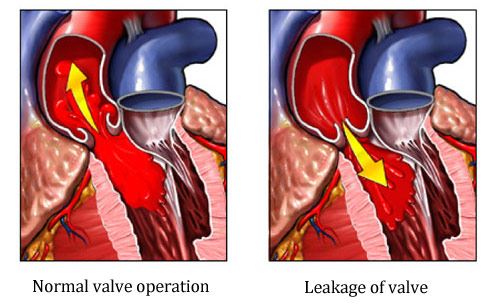Aortic Valve Regurgitation
In aortic valve disease, the aortic valve may not be closing properly, which causes blood to leak backward to the left ventricle (regurgitation), or the valve may be narrowed (stenosis). Aortic valve regurgitation (AR) or aortic valve regurgitation is a condition in which blood leaks back through the valve as the heart relaxes. This leakage may prevent your heart from efficiently pumping blood to the rest of your body. As a result, you may feel fatigued and short of breath, and can potentially lead to heart failure.

Medical Illustration Copyright © 2019 Nucleus Medical Media, All rights reserved.
Causes of Aortic Valve Regurgitation
Although the exact cause is unknown, certain conditions, traits or habits may raise your risk for the disease. These are known as risk factors.
Non-Modifiable Risk Factors: These factors are irreversible and cannot be changed. The more of these risk factors you have, the greater your chance of aortic regurgitation.
- Older age
- Family History/Genetics
Modifiable Risk Factors: These factors can be modified, treated or controlled through medications or lifestyle changes.
- Uncontrolled high blood pressure.
Other conditions that contribute to aortic valve regurgitation:
- Congenital heart disease
- Rheumatic fever
- Endocarditis
- Aortic dissection
- Trauma to the heart valve or aorta.
Symptoms of Aortic Valve Regurgitation
There are varying degrees of aortic regurgitation. Patients may have a mild, moderate or severe leaking of the valve. Some patients with aortic regurgitation may not experience symptoms for many years. With time, however, patients with severe aortic regurgitation may develop symptoms which may include some or all of the following:
- Heart palpitations
- Chest pain
- Fatigue
- Shortness of breath
- Weakness
- Lightheadedness/fainting
- Swollen ankles and feet
Diagnosis of Aortic Valve Regurgitation
Your doctor will ask you about symptoms and perform a physical examination which will include listening to your heart with a stethoscope to identify a heart murmur (whooshing or swishing sounds). After that, you may also have diagnostic tests and procedures including:
- Electrocardiogram (EKG/ECG)
- Echocardiogram (ECHO)
- Stress test
- Cardiac catheterization
- Computed tomography (CT scan)
- Magnetic resonance imaging (MRI)
Treatment of Aortic Valve Regurgitation
Treatment of aortic regurgitation depends on the severity of your disease which is determined by signs, symptoms and testing. Based on the findings, your doctor may recommend treatment options including lifestyle changes, medications or medical or surgical procedures.
Lifestyle Changes
- Avoid smoking.
- Eat a heart-healthy diet.
- Exercise under directions of your doctor.
- Manage stress.
- Address risk factors for coronary artery disease such as obesity, high blood pressure, and high cholesterol.
- Make and keep appointments to see your doctor for routine checkups and follow-up tests.
Medications
- Beta blockers will help reduce your blood pressure.
- Diuretics “water pills” will help reduce the amount of fluid retention in your body.
